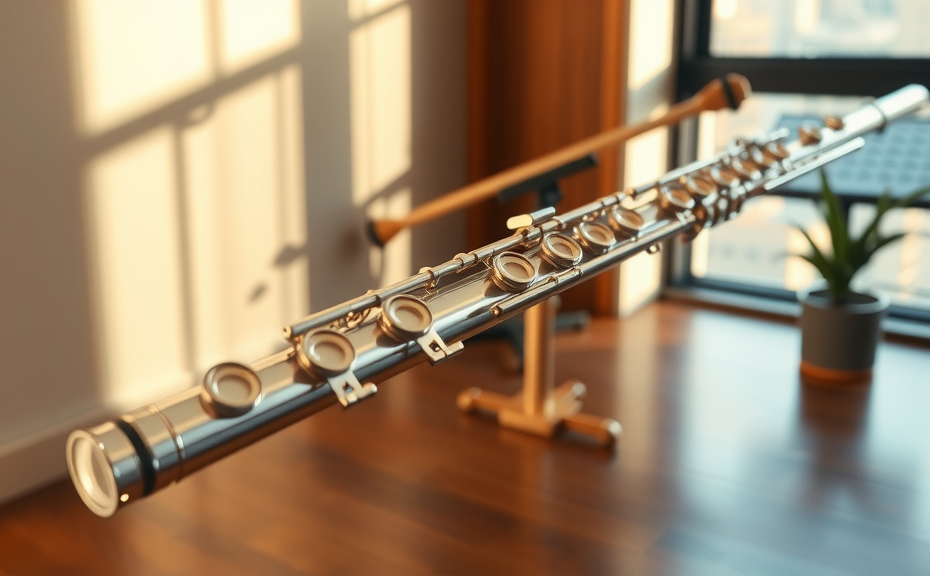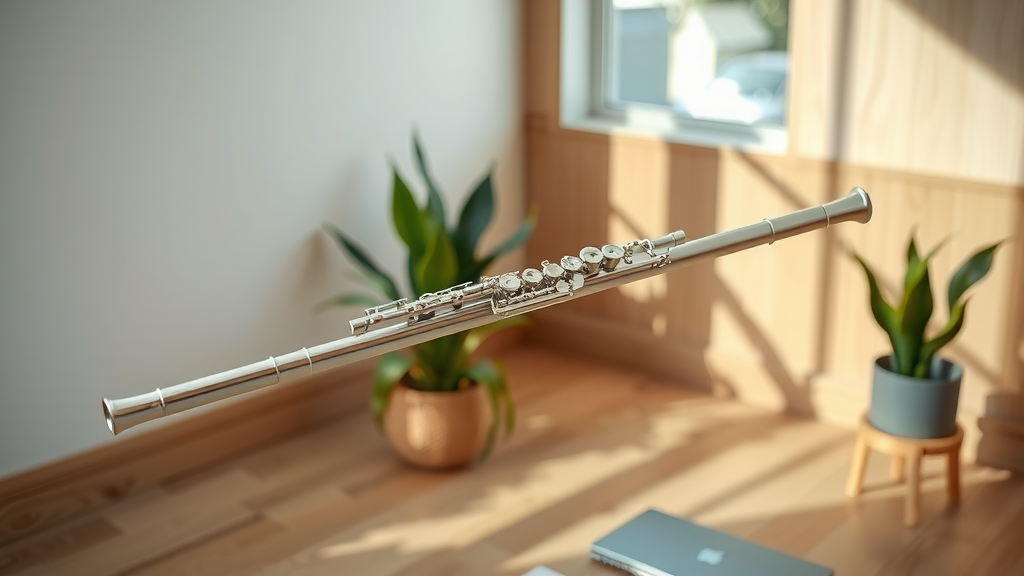Choosing the right instrument can greatly influence a musician’s early journey. Designed with newcomers in mind, Powell flutes offer a blend of quality and craftsmanship that is particularly appealing.
These flutes boast a durable construction, which contributes to their longevity and allows new players to concentrate on skill development without frequent repairs.
The sound quality produced is impressive; the tonal richness available in Sonare flutes creates a warm and inviting auditory experience that can inspire learners.
The thoughtful design elements enhance playability, making for smoother transitions as novices progress.
Are Sonare Flutes Worth The Investment
For musicians evaluating their options, selecting a quality flute can significantly enhance their playing experience. Sonare instruments are crafted to deliver a rich, vibrant sound, making them appealing to both enthusiasts and professionals alike.
Constructed from premium materials like silver and wood, these professional instruments exhibit tonal qualities that are often sought after.
Notably, the playability of Sonare flutes shines in both solo performances and ensemble settings, accommodating various artistic expressions.
Their reputation for durability ensures that they retain a strong resale value, making them a smart choice for future musicians looking to invest wisely in their craft.
Understanding Powell Flutes Craftsmanship
The craftsmanship behind these musical instruments is a meticulous blend of artistry and engineering excellence. Renowned for their outstanding quality, the manufacturer employs traditional methods alongside contemporary advancements.
Each piece undergoes extensive hand-finishing, enhancing the aesthetic appeal while improving resonance.
Careful selection of materials is paramount, aimed at boosting durability without compromising the instrument’s rich tone.
A distinctive headjoint design is integral, optimizing intonation across various registers for refined performance. Tailored customization options empower musicians to fine-tune their instruments, promoting ease of playing and superior adaptability to individual playing styles.
Musical Instrument Craftsmanship
- Traditional craftsmanship combined with modern technology enhances instrument quality.
- Extensive hand-finishing improves both aesthetic appeal and sound resonance.
- Careful material selection increases durability while maintaining rich tonal quality.
- Customizable features allow musicians to adapt instruments to their unique playing styles.
How Does Sound Quality Compare
Quality of sound significantly impacts the performance and enjoyment of a flutist. Defined by attributes such as timbre, projection, and intonation, this aspect warrants careful consideration.
Players, whether novices or seasoned musicians, can enhance their material selection by grasping how sound characteristics align with their playing style.
The material selection is a defining factor in sound profile.
For instance, wood flutes typically produce warmer tones, while metal options offer brighter sounds.
Additionally, design elements, including embouchure shape, can influence how effectively sound is projected, ultimately making the instrument more responsive to a player’s technique.
Factors like tuning and flute types should also be evaluated, as they all contribute to the overall musical expression. Transitioning from the craftsmanship of Powell flutes, it becomes clear that their aesthetics, projection, tuning, and embouchure are intricately influenced by the choice of flute types and material selection.
The Playability Of Sonare Flutes
The design and engineering of flutes significantly affect how fluidly they can be played. Optimized for a range of musicians, these instruments ensure ease of use, a factor particularly important for both novices and seasoned players.
Elements such as material quality, construction, and ergonomic key placement heavily influence overall performance.
High-quality metals and innovative design choices contribute to both comfort and responsiveness, enabling musicians to enjoy a seamless playing experience.
Customer feedback frequently notes the impressive balance and weight of these instruments, which enhances effective handling whether in orchestral performance or casual practice settings. Such characteristics collectively cater to diverse skill levels and playing styles.
A standout aspect of these flutes is the adjustable mechanism, which facilitates precise tuning adjustments.
This benefit is especially advantageous for intermediate models, as it enables players to refine their sound to suit various musical contexts. When comparing to other brands, it becomes evident that their reputation, customer feedback, beginner options, intermediate models, advanced instruments, and orchestral performance set them apart.
Flute Design and Performance
- High-quality materials and ergonomic design enhance comfort and responsiveness for musicians.
- Adjustable mechanisms allow for precise tuning adjustments, beneficial for intermediate players.
- Customer feedback highlights the impressive balance and weight of the instruments for better handling.
- Instruments cater to a wide range of skill levels and playing styles, from beginners to advanced musicians.
What Makes A Good Flute Brand
A flute brand’s reputation hinges on several key aspects, each playing a significant role in its overall quality. The selection of materials is paramount; options like solid silver and gold enhance the tone and ensure durability, while distinctive materials such as grenadilla wood impart unique sound qualities, appealing to solo play enthusiasts.
Craftsmanship is another important element; instruments that are hand-finished often exhibit better playability and intonation, which are crucial for both performance and practice.
Many respected brands also provide a range of accessories, including cases, tailored to protect and enhance the flute.
Feedback from the flute community can serve as a valuable resource to evaluate a brand’s reliability and the consistency of sound quality across its offerings. Transitioning from examining what defines a reputable brand, it is also crucial to delve into how different instruments impact tonal richness during performances. </flute accessories, mouthpieces, and cases that enhance solo play and support the flute community through proper maintenance.
Evaluating Tonal Richness In Performance
Each performance can transform with the depth and quality of sound produced by musicians. The perception of these nuances is heavily influenced by factors such as the anatomical features of the flute, which greatly affect how tonal qualities emerge.
Flutes constructed from various materials, such as silver or gold, contribute distinct characteristics to the instrument’s output.
The player’s technique is equally influential; elements like breath control determine the dynamics and overall expression of every note produced.
Articulation techniques can significantly enhance tonal richness, shaping how melodies resonate. Many enthusiasts might be surprised to learn that even beginner-friendly flutes can produce exceptional sound quality, underscoring a harmony between skill level and instrument selection.
This interplay is vital when considering the next points of reference, such as what constitutes a reputable flute brand and the overall feedback received on models like Powell flutes.
Customer Feedback On Powell Flutes
Users consistently express high regard for the tonal properties of these instruments, highlighting unique aspects that set them apart in the woodwinds category. Feedback indicates a strong appreciation for the sound quality, with many noting the warm tone and exceptional clarity achieved during performances.
In evaluations comparing different brands, these instruments often stand out due to their intricate depth and richness of sound.
Sound Quality: Many customers commend the tonal richness, specifically citing how the models produce a warm, resonant tone that enhances musical expression.
Users frequently remark on the superior clarity and depth when these flutes are contrasted with other options, leading to a favored status among musicians who prioritize sound quality.
Beginner Friendly: A significant number of reviews suggest that while these instruments are premium options, they are also tailored for accessibility. Features like woodwinds, sound comparison, model variations, makers, evaluation, and personal preference significantly influence the choice of instruments.
Exploring Flute Types And Their Benefits
Choosing the right type of flute can significantly enhance a musician’s experience and performance. Various flutes, including concert, alto, and bass, exhibit unique acoustic properties tailored to different musical genres.
Each flute type caters to distinct skill levels and can notably affect a player’s learning curve.
For example, the concert flute is prized for its versatility, while the alto flute is favored for its warmer tone, which can enrich a player’s education in sound dynamics.
The construction material also plays a critical role in longevity and maintenance of the instrument. Investing in a high-quality flute can improve resale value, enabling musicians to upgrade without incurring financial loss.
Choosing the Right Flute
- Different types of flutes, such as concert, alto, and bass, are designed for specific musical genres and styles.
- The concert flute is known for its versatility, making it suitable for a wide range of musical performances.
- The alto flute offers a warmer tone, which can enhance a musician’s understanding of sound dynamics.
- High-quality flutes tend to have better resale value, allowing musicians to upgrade their instruments without significant financial loss.

